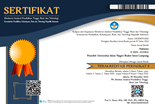Building Optimal Employee Performance: The Strategic Role of Work Passion and Organizational Commitment
Abstract
This study is motivated by the low employee performance. Employee performance is influenced by work passion and organizational commitment. This study aims to empirically test the relationship between work passion, organizational commitment, and employee performance. The main hypothesis proposed in this study is that work passion and organizational commitment are jointly correlated with employee performance. The minor hypotheses proposed are: 1) Work passion is positively correlated with employee performance, and 2) Organizational commitment is positively correlated with employee performance. This study involves 97 male and female employees, with a purposive sampling technique used to select participants. The characteristics of the subjects in this study are: 1) Employees of CV SP Aluminum, 2) Both male and female employees, and 3) Employees with more than 2 years of work experience. Data collection was carried out using employee performance scales, work passion scales, and organizational commitment scales. The analysis technique used was multiple linear regression with SPSS 22. The first minor hypothesis showed a t-value of -0.183 and a significance value of p = 0.855, indicating that this hypothesis was not statistically supported. This result shows that work passion has no significant relationship with employee performance. Interestingly, the negative beta coefficient indicates a potential reverse relationship, although insignificant. This negative contribution may reflect the complexity of the work passion dimension, including both harmonious and obsessive passion. Harmonious passion increases intrinsic motivation at work, while obsessive passion can lead to emotional exhaustion and decreased performance. These findings are consistent with previous research (e.g., Appienti & Chen, 2020; Kemie, 2020; Fawwaz, 2023), which shows that work passion does not always positively impact performance and, in some cases, can even be counterproductive. Therefore, it can be concluded that work passion does not correlate with employee performance. The second minor hypothesis, with a t-value of 3.157 and a p-value of 0.002, can be interpreted as supporting the second minor hypothesis. Therefore, it can be concluded that organizational commitment positively correlates with employee performance. The effective contributions of work passion and organizational commitment to employee performance are -0.07% and 9.77%, respectively.
Keywords: Employees, Employee Performance, Organizational Commitment, Work Passion
Keywords
Full Text:
PDFDOI: http://dx.doi.org/10.24042/ajp.v8i1.26485
Refbacks
- There are currently no refbacks.
Copyright (c) 2025 Risna Nor Hasanah













